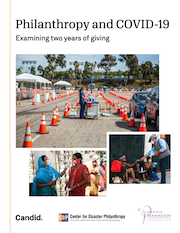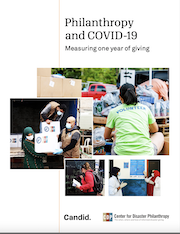Site Search
- resource provided by the Forum Network Knowledgebase.
Search Tip: Search with " " to find exact matches.
How can philanthropic efforts go beyond addressing isolated challenges to fund the interconnectedness of social, economic, racial, and environmental disparities?
This webinar will explore how family philanthropy can play a pivotal role in supporting systems change by addressing the intersectionality of multiple issues and identities. By recognizing how factors such as race, gender, disability, and socioeconomic status intersect, family philanthropies can create more holistic, impactful solutions.
You will learn strategies to identify and support initiatives that address root causes, build resilience, and create systemic shifts by centering those most impacted by injustices.
Cost: This event is free for CNJG Members who are family foundations.
Other types of foundations are ineligible to join this webinar.
This program is a CNJG membership benefit for family foundation members, including staff and trustees, in partnership with the National Center for Family Philanthropy.
How does your family philanthropy define and cultivate a legacy? What is the desired impact of your giving and who do you hope will contribute to it? At what stage do you bring participants into the work—including the next generation—and engage them in a meaningful way? We’ll explore these questions and more, and hear case studies from family philanthropies navigating transitions, fostering family engagement, and exploring their legacies.
Cost: This event is free for CNJG Members who are family foundations.
Other types of foundations are ineligible to join this webinar.
This program is a CNJG membership benefit for family foundation members, including staff and trustees, in partnership with the National Center for Family Philanthropy.
Grantmakers Concerned with Immigrants and Refugees (GCIR) in collaboration with National Committee for Responsive Philanthropy (NCRP), present a briefing that features a panel of speakers representing nonprofit organizations working on the front lines to strengthen our democracy and advance immigrant rights in their communities. Don’t miss this opportunity to hear what groups need as we move into 2025 and beyond, directly from movement leaders.
According to a report from National Committee for Responsive Philanthropy, since 2012 there has been an 11 percent shrinkage in philanthropic funding towards immigrant movement groups. While there was an uptick in rapid response funding between 2017-2018, this has not created the conditions for the long term sustainability of immigrant serving organizations.
In a critical election year, over 60 anti-immigrant bills have been introduced in state legislatures nationwide. Immigrant advocacy groups – already facing a myriad of historically systemic challenges such as burnout, unlivable wages, and hostile state level political environments – are facing this wave of anti-immigrant sentiment, often at the sacrifice of their own safety and well being. And while philanthropic interest has focused on the national elections and scenario planning, movement groups are already planning for 2025 and an uncertain future regardless of presidential election outcomes. Philanthropy must not only meet this moment but also invest in the critical infrastructure needs of organizations and movements, particularly at the local and state levels.
As right wing movements seek to undermine our democracy on all fronts, immigrant communities cannot be left behind and must be included in any political, social, or philanthropic efforts that seek to build a multi-racial democracy. Built through the collaborative efforts of GCIR and NCRP, this briefing will feature a panel of speakers representing nonprofit organizations working on the front lines to strengthen our democracy and advance immigrant rights in their communities. Don’t miss this opportunity to hear what groups need as we move into 2025 and beyond, directly from movement leaders.
Cost: Free for Funders
Must log in or create an account to register on GCIR’s website.


Every person wants to lead a safe and healthy life. We want the opportunity to fulfill our greatest potential, and to receive the support and guidance we need to travel down our own unique path. We wish this for ourselves and seek it for our children and loved ones.
In fact, communities all over the country go to great lengths to create conditions for young people to thrive. Every year, efforts to promote youth wellbeing amount to hundreds of billions of dollars in public expenditures in education, health care, community development, and related fields. Together with significant resource contributions from the philanthropic, nonprofit, academic and private sectors, these investments make clear that creating, promoting, and sustaining health and safety for young people is a national priority.
This report details how funders can embrace the power of young people to advance healthier and safer communities.
Nina Stack has dreamed of being a philanthropist since long before she could probably even spell the word.
As a child, Stack would fantasize about working for the United Nations. She loved "trick-or-treating for UNICEF," and the idea that she could help children who lived in such horrible conditions was profound, Stack said. "To me, naively perhaps, the UN meant there would be no more war and children wouldn’t die of starvation," she said. "In many ways, collecting donations in that little orange box was my first experience with philanthropy."
Stack loved those early experiences. Today she continues to reach out to help others. Stack is president of the Council of New Jersey Grantmakers (CNJG), which she has led since 2005. The statewide association serves as a network, advocate and resource for more than 100 foundations in New Jersey.
On this webinar, Newark funders discussed the childcare practice and policy during COVID-19 and heard front line observations on matters of mental health and domestic violence.
Speakers:
Ceil Zalkind, President and CEO, Advocates for Children of New Jersey
Beverly Lynn, CEO, Programs for Parents
Maria Ortiz, Executive Director, Student Life, Newark Board of Education
LaKeesha Eure, Director, Shani Baraka Women’s Resource Center and Chair, Newark Anti-Violence Coalition
Webinar Video
The New Jersey Council for the Humanities (NJCH) recently awarded $199,637 in Incubation and Action Grant funding to sixteen organizations. Incubation Grants help organizations plan, research, develop, and prototype public humanities projects and events. Action Grants help organizations implement a wide array of humanities-based projects, including public programs, exhibitions, installations, tours, and discussion groups.<BR><BR>
Public humanities programming allows individuals to engage in lifelong learning and share in the exploration of history, values, cultures, and beliefs. NJCH supports and acts as a resource for cultural and service-oriented nonprofit partners as they bring the public humanities to the residents of New Jersey, harnessing the power of the humanities to strengthen communities.
The Overdeck Family Foundation has announced third-quarter grants totaling $13.5 million.
Six new grants and twenty-seven renewal grants were awarded in support of cost-effective programs with the potential to accelerate improvement in key academic and socioemotional outcomes for all children. Recipients include Future City, a four-month-long afterschool STEM program for grades six through eight, which was awarded $200,000 to increase the number of under-resourced students served, diversify revenue streams, and refine data tracking and reporting practices; Teaching Lab, which will receive $200,000 to pilot a virtual, adaptive, and competency-based delivery model; and Public Impact, which was awarded $700,000 in support of efforts to restructure Pre-K–12 schools to extend the reach of excellent teachers, principals, and their teams to more students, for more pay, within recurring school budgets.
As we navigate today's challenges and opportunities, it's important that we continue to gather, exchange ideas, and move forward the causes we value. We all know how a single conversation can spark a big idea or inspire a new partnership.  That's why you won't want to miss our much-anticipated 2024 Spring Colloquium: Empowering the Future: Harnessing AI and Data for Philanthropic Social Impact - a must-attend gathering for every funder working in New Jersey. Join us for valuable insights and opportunities to connect with colleagues and passionate thought leaders who share your commitment to driving social change.
That's why you won't want to miss our much-anticipated 2024 Spring Colloquium: Empowering the Future: Harnessing AI and Data for Philanthropic Social Impact - a must-attend gathering for every funder working in New Jersey. Join us for valuable insights and opportunities to connect with colleagues and passionate thought leaders who share your commitment to driving social change.
I look forward to seeing you there and engaging in the vibrant discussions and community building opportunities that awaits us.
Thank you to the generosity of our sponsors: Signature Sponsor - PSE&G, Collaborator Sponsor - Wells Fargo, Connector Sponsors - Campbell Soup Company, Sixers Youth Foundation, and Robert Wood Johnson Foundation, and Exhibitor Sponsor - PKF O'Connor Davies. We couldn't do this without you.
We look forward to seeing you there!
Sincerely,
Theresa Jacks, President and CEO
Council of New Jersey Grantmakers
